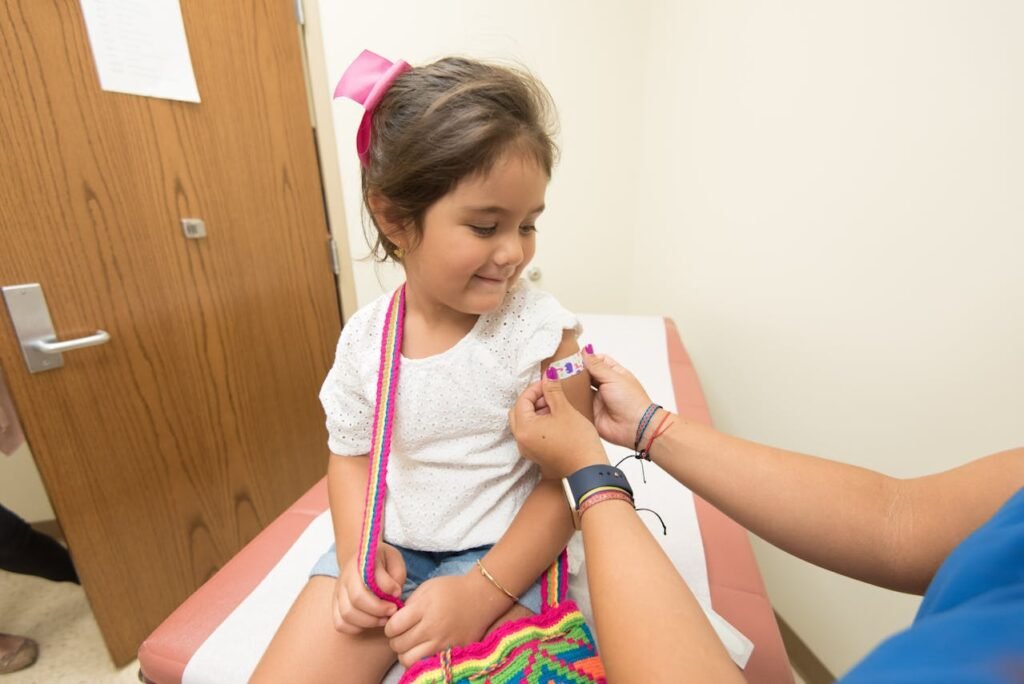Ensuring your child grows up healthy and strong is every parent’s priority. One of the most effective ways to support your child’s well-being is through regular well-child visits. These routine check-ups serve as a proactive approach to healthcare, helping parents and pediatricians monitor development, administer necessary vaccinations, and address any potential concerns early on.
By scheduling well-child visits, you provide your child with consistent healthcare that focuses on prevention, education, and growth tracking. This blog will help you understand why these visits are essential, what they include, and how they contribute to your child’s overall health and future well-being.

What Are Well-Child Visits?
Well-child visits, also known as pediatric check-ups, are scheduled health evaluations for children from infancy through adolescence. These visits are designed to ensure that children meet developmental milestones, receive necessary immunizations, and gain early intervention for any health issues.
Why Are Well-Child Visits Important?
- Early Detection of Health Concerns – Pediatricians can identify and address potential issues before they become serious.
- Tracking Growth and Development – Monitoring your child’s height, weight, and motor skills ensures they are growing at a healthy pace.
- Vaccinations and Preventive Care – Protecting your child from serious illnesses through scheduled immunizations.
- Parental Guidance and Support – Educating parents about nutrition, sleep, behavior, and safety.
- Building a Strong Doctor-Patient Relationship – Establishing trust and familiarity with a pediatrician enhances your child’s comfort with medical visits. (Learn more about the importance of a strong doctor-patient relationship.)
When Should You Schedule Well-Child Visits?
The American Academy of Pediatrics (AAP) recommends regular well-child visits at the following intervals:
- Newborn: Within the first week of birth
- Infancy: 1, 2, 4, 6, 9, and 12 months
- Toddler Years: 15, 18, 24, and 30 months
- Early Childhood: Annually from ages 3 to 5
- School Age to Adolescence: Every year until age 18
By following this schedule, parents ensure that their child receives timely care, age-appropriate screenings, and vaccinations.
What Happens During a Well-Child Visit?

Each well-child visit is tailored to your child’s age and health needs. However, most check-ups include the following essential components:
1. Physical Examination
Pediatricians assess your child’s overall health by checking:
- Height and weight measurements
- Head circumference for infants
- Reflexes, motor skills, and coordination
- Heart and lung function
- Vision and hearing tests
2. Growth and Development Monitoring
Tracking milestones is a key aspect of well-child visits. Your pediatrician will evaluate your child’s:
- Cognitive skills
- Speech and language development
- Social and emotional behavior
- Motor skills (fine and gross)
3. Vaccinations and Immunizations
Vaccines are a crucial part of preventive care. Your pediatrician will ensure your child receives the recommended immunizations based on their age. Immunizations protect against illnesses such as:
- Measles, Mumps, and Rubella (MMR)
- Polio
- Hepatitis A & B
- Diphtheria, Tetanus, and Pertussis (DTaP)
- Chickenpox (Varicella)
4. Nutritional and Dietary Guidance
Nutrition plays a vital role in your child’s development. Pediatricians provide guidance on:
- Age-appropriate diets
- Managing food allergies
- Encouraging healthy eating habits
- Proper hydration
5. Behavioral and Emotional Health Check
Mental and emotional well-being is as important as physical health. Pediatricians assess:
- Sleep patterns
- Anxiety and stress levels
- Social interactions
- Attention and focus
6. Parental Counseling and Education
Well-child visits are also an opportunity for parents to ask questions and seek advice on:
- Safety measures (e.g., car seats, home safety, screen time limits)
- Proper dental care
- Managing childhood illnesses
- Promoting positive discipline techniques
The Long-Term Benefits of Well-Child Visits
Regular check-ups provide long-term health benefits, including:
- Stronger Immunity: Early vaccinations help build resistance to serious diseases.
- Healthy Growth and Development: Ensuring that developmental milestones are met.
- Early Intervention: Addressing health concerns before they become major issues.
- Parental Confidence: Providing parents with expert guidance on raising a healthy child.
Choosing the Right Pediatrician for Well-Child Visits

Selecting a pediatrician who aligns with your family’s values is key to making well-child visits effective. Factors to consider include:
- Experience and Qualifications – Look for board-certified pediatricians with expertise in child healthcare.
- Communication and Trust – A good pediatrician takes time to listen to concerns and provide clear guidance.
- Convenient Location and Accessibility – Choose a practice that fits your schedule and is easily accessible.
- Holistic Approach – A pediatrician should focus on both physical and emotional well-being. (Learn more about personalized pediatric care.)
How to Prepare for a Well-Child Visit
Maximize the benefits of a well-child visit by being prepared:
- Make a list of questions – Note any concerns about growth, development, or behavior.
- Bring medical records – Keep track of vaccinations, allergies, and past illnesses.
- Observe changes in behavior – Share observations about eating, sleeping, and social interactions.
- Discuss any family medical history – This helps pediatricians assess potential genetic health risks.
Well-child visits play a pivotal role in your child’s overall well-being. These check-ups provide an opportunity for preventive care, developmental monitoring, and parental education, ensuring that your child grows up healthy and happy.
By prioritizing these visits, parents empower their children with stronger immunity, better growth, and lifelong healthy habits. If you’re looking for a trusted pediatrician to guide your child’s health journey, schedule a well-child visit today.
Investing in regular well-child visits is one of the best decisions you can make for your child’s future. Stay proactive, stay informed, and give your child the healthcare they deserve!
